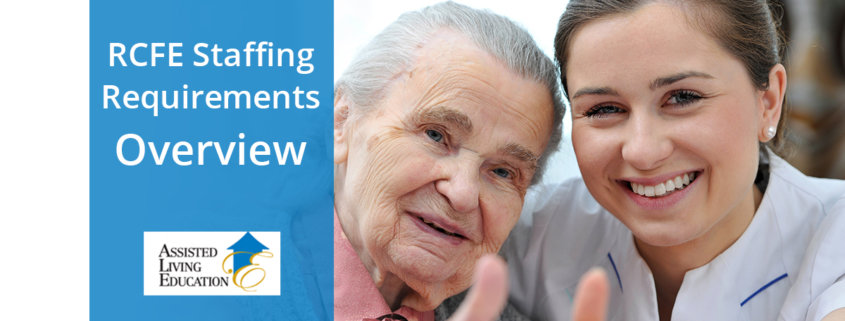RCFE Staffing Requirements Overview
In California, one option for seniors 60 years or older requiring long term care is a “social model” that provides room, meals, personal care assistance, supervision, observation, housekeeping and planned activities. A Residential Care Facility for the Elderly (RCFE) can care for one or more persons and must be licensed by the State of California to provide care services.
RCFEs operate as a bridge for those who require some level of assistance that prevents them from living on their own but who do not require 24-hour medical care, service, or supervision.
RCFE’s vary in size but there are basically two models: 16+ residents or 1-15 residents. The 16+ are owned or operated by Sunrise, Brookdale and Atria to name a few. The 1-15 model is typically a home in a residential area and often called a “board and care”. Unlike nursing homes, RCFEs may have licensed professionals as personnel, but it is not required to do so.
RCFE Administrator Certification and Licensing
The administrator is responsible for the care and supervision of residents, staff management, and adhering to regulations, policies and procedures. Regulations require the administrator to complete an 80-hour certification course and pass a 100 question state examination with a score of 70% or better to receive a certificate.
The administrator must complete 40 hours of continuing education units (CEUs) every two years. Fortunately, Assisted Living Education (ALE) is one of 15 vendors that provide RCFE administrator certification classes. Additionally, the RCFE itself must be licensed. The process involves completing an RCFE license application, which ALE offers assistance with your RCFE application and licensing. An RCFE license is renewed annually and must be inspected by DSS yearly.
RCFE Staff Requirements
California laws require RCFE’s to ensure that the community has “sufficient staff at all times and competent to provide the services necessary to meet resident needs.” There is no detailed requirement of how a community is to interpret this regulation.
The resident care needs indicate how many staff are required to render care. The communities with 1-15 residents usually have two to three caregivers during the day and one caregiver at night. There are no resident ratios. The administrator or a qualified designated substitute must be on-site 24 hours a day.
California regulations require the following:
- Employees who provide direct care to the residents and employees who supervise employees must be 18 years or older.
- The administrator must be 21 years or older.
- The administrator must have a high school diploma or GED for 1-15 residents; 15 college units and one year of experience for 16-49 residents; 2 years of college and three years experience for a community with 50 or more residents.
- At least one staff member must be CPR certified and on the premises 24 hours per day.
- Any personnel who provide care to the residents must have first-aid certification.
- All personnel and some volunteers must have a Criminal Record Clearance before employment approval.
- All personnel must have a health screen and negative TB test.
- Additional staff shall be employed as necessary to perform office work, cooking, house cleaning, laundering, and maintenance of buildings, equipment and grounds.
RCFE Staff Training Requirements
All personnel assisting residents with ADL’s must complete 20 hours of initial training prior to assisting a resident and an additional 20 hours of training within the first four weeks of employment.
The topics include: the aging process; personal care; physical limitation; ADL’s; resident rights; medication policies and procedures; psychosocial needs of the elderly; recognizing signs and symptoms of dementia; 12 hours of dementia training; postural supports; hospice care; restricted health conditions; LGBT; elder and dependent adult abuse reporting; theft and loss; disaster training; food service and safety; and care of a bedridden resident.
Staff are also taught required subjects by the Occupational Health and Safety Administration (OSHA) that includes universal precautions, Hepatitis B, bloodborne pathogens, Personal Protective Equipment (PPE), and Safety Data Sheets (MDS).
All staff assisting residents with self-administration of medications must receive 10 hours of training for 1-15 residents and 24 hours for 16 or more residents and all communities must provide an additional 8 hours training each year.
ALE provides online training for employees that allows the employee to progress at his/her pace. The following link will provide information about ALE’s training products for staff training.
RCFE Policies and Procedures
Once the facility is licensed, RCFEs are required to have a Plan of Operation that includes: policies and procedures for admissions; staffing plan, qualifications and duties; plan for training staff; organizational chart; sketches of the floorplan and the yard; policy for family visits and communication. ALE has created an assisted living policies and procedures manual.
The topics covered here provide you a high-level overview of RCFE staffing requirements in California along with links to helpful resources. Thank you for the essential care RCFE’s deliver to the aging community, and we hope the information here will help you continue to achieve that goal.
People Also Ask
What is the difference between ARF and RCFE? An ARF (Adult Residential Facilities) are non-medical that provide basic care and may include housekeeping, supervision, personal care assistance, and the like. ARF provides 24-hour non-medical care. RCFEs provide non-medical care to people who need assistance with activities of daily living (ADLs). RCFE care does not require 24-hour nursing care.



